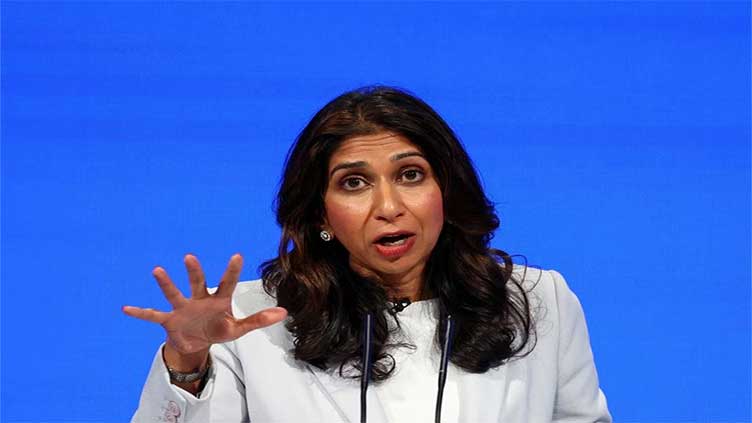UK's interior minister accuses police of pro-Palestinian bias over marches

World
UK's interior minister accuses police of pro-Palestinian bias over marches
LONDON (Reuters) - Britain's interior minister escalated a dispute with London's police force on Thursday over the handling of a planned, large pro-Palestinian march on Armistice Day, accusing officers of taking a softer stance towards left-wing causes.
Home Secretary Suella Braverman has taken a tough line on the tens of thousands of protesters who have gathered in London since the Hamas group's Oct. 7 attack on Israel, calling them "hate marches" and "mobs" that threaten the Jewish community.
Critics in opposing parties and her own have accused her of stoking division and undermining the police. They also question her commitment to free speech after she questioned why some public gatherings should not be banned when they are offensive.
Increasing the tension, police have said they expect a large rally on Saturday Nov. 11, the anniversary of the end of World War One, prompting fears that counter-protesters will also descend on the capital, which could lead to violence.
London police chief Mark Rowley has said that any ban would require intelligence of a threat of serious disorder and that so far that threshold had not been crossed.
"I do not believe that these marches are merely a cry for help for Gaza," Braverman, who is on the right of her party and is the minister in charge of policing, wrote in The Times. "They are an assertion of primacy by certain groups -particularly Islamists — of the kind we are more used to seeing in Northern Ireland.
Advertisement · Scroll to continue
"Unfortunately, there is a perception that senior police officers play favourites when it comes to protesters," she wrote, contrasting what she said was the different way anti-lockdown protesters were dealt with during the COVID pandemic, and Black Lives Matters demonstrations.
RALLYING CRY
Protesters have gathered in London every weekend to demand a halt to Israel's aerial and ground offensive against Hamas-ruled Gaza, with around 100,000 the largest number marshalled so far.
While there has been little overt violence, banners appearing to celebrate the cross-border Hamas attack - in which 1,400 Israelis were killed, mainly civilians - have been seen and the chant of "From the river to the sea" heard, a pro-Palestinian rallying cry that is viewed by many Jews as antisemitic and calling for Israel's eradication.
In total since Oct. 7, police say they have arrested nearly 200 people for acts of antisemitism, Islamophobia and public order offences such as letting off fireworks towards officers.
British Prime Minister Rishi Sunak has described Saturday's planned march as disrespectful and said he would hold Rowley to account that the remembrance events are safeguarded.
But he said Britain must remain true to the principles it fought for during the two world wars, including the right to peacefully protest and to free speech "even if we disagree with them".
Braverman, seen as a possible future Conservative party leader, often takes a harder line than her party as a whole on issues such as crime and immigration. She recently described being homeless as a "lifestyle" choice.
A spokesperson for Sunak said his office had not cleared the article and it was looking into how it was published, but the British leader retained full confidence in Braverman.
Opposition Labour Party leader Keir Starmer said Sunak was too weak to challenge her.
Some centrist Conservative lawmakers called for her dismissal. Even those on the right-wing of the party said she should be more careful with her language, saying the reference to Northern Ireland would alienate those who held civil rights marches and pro-British Loyalist rallies in the past.
Neil Basu, a former senior London police officer, said the political criticism could increase the likelihood of counter protesters turning up, raising the risk of violence.
"It's somewhat ironic that all of this rhetoric about this march might actually be increasing the intelligence case, to have it banned," he told LBC Radio. In a separate incident, two men were arrested over damage to the Cenotaph war memorial in the northern English town of Rochdale.
Organisers have said they do not plan to march in London on Sunday Nov. 12 when political leaders join King Charles and members of the military to remember those who have died in war at a sombre annual ceremony.


